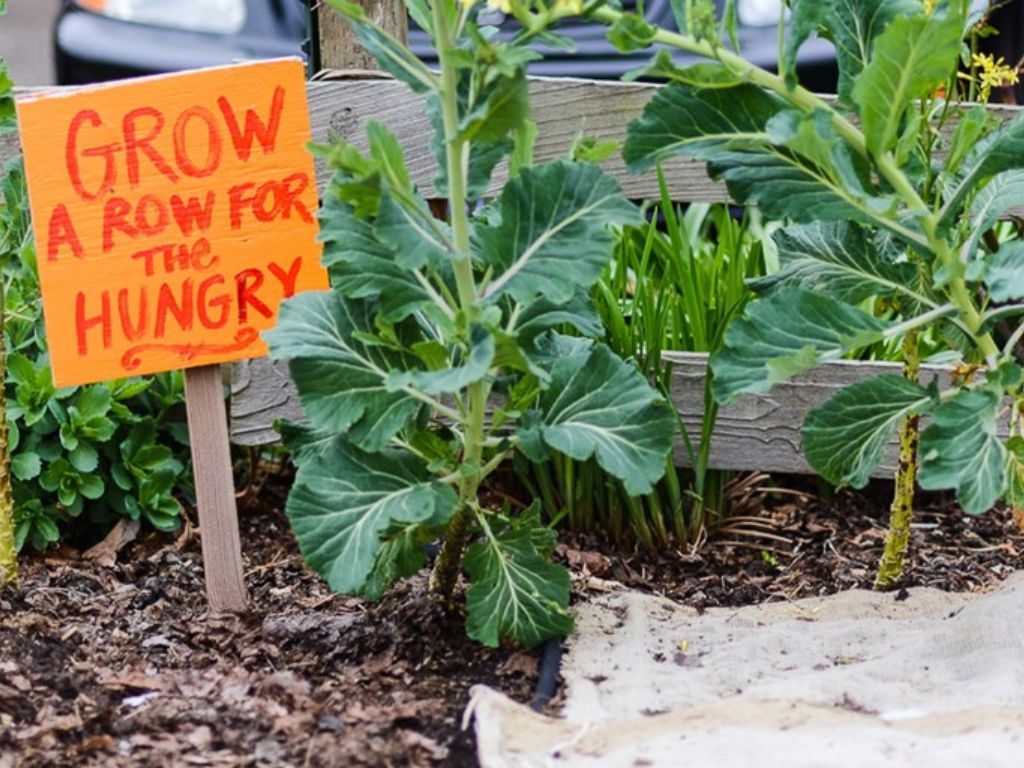There is nothing more inspiring than talking to people who really love what they do. I spoke with Azlan Guttenberg Smith, Fiona Munro, and Dustin Bacon who work with Solidarity Gardens in various ways. These gardens as Smith puts it, “are a practical way of planting collaboration, possibility, and support in our communities.” These gardens play a part in addressing food insecurity and it is inspiring to read about the people, plants, and spaces that work together to create a community rooted in togetherness.
This interview has been edited for length and clarity.
Smile Politely: Can you tell me a little bit about yourselves, your pronouns, and what you do?
Azlan Guttenberg Smith: I’m excited to have this chance to chat together. My pronouns are they/them, and one of my favorite ways to think of myself is as a community member, organizer, and community art facilitator. I wear other hats, too — I’m an educator, a PhD Candidate in Writing Studies, a writer. I’m a walker: at night, in the morning, when it’s cold and the ice cracks like glass. And really for me it all comes back to thinking about who we are to each other. How we make community together. Another way to say that is, I came into this project in part because Dusty and I are friends, and I’m coming out of this project closer friends with Dusty and new friends with Fiona and so many others.
Fiona Munro: I use she/her pronouns. I’m the Outreach and Education Coordinator for Sola Gratia Farm, and, for the past few years, served as the main administrator for Solidarity Gardens. My role with the Solidarity Gardens collaborative has been to organize our funding and resources, as well as provide some technical gardening support through my connection with Sola Gratia. When I’m not working on Solidarity Gardens, I lead educational programming for the farm and work to deepen our community partnerships.
Dustin Bacon: I use they/them pronouns. I’ve been involved with Solidarity Gardens for three to four years now, first as a volunteer, then as an intern. Last year I received a grant from the Regenerative Agriculture Institute to serve as our Community Liaison, which means I helped connect gardens with volunteers and resources through the 2023 season. Now that grant has concluded and I’m volunteering up in our permaculture plot at the Wood Street garden.
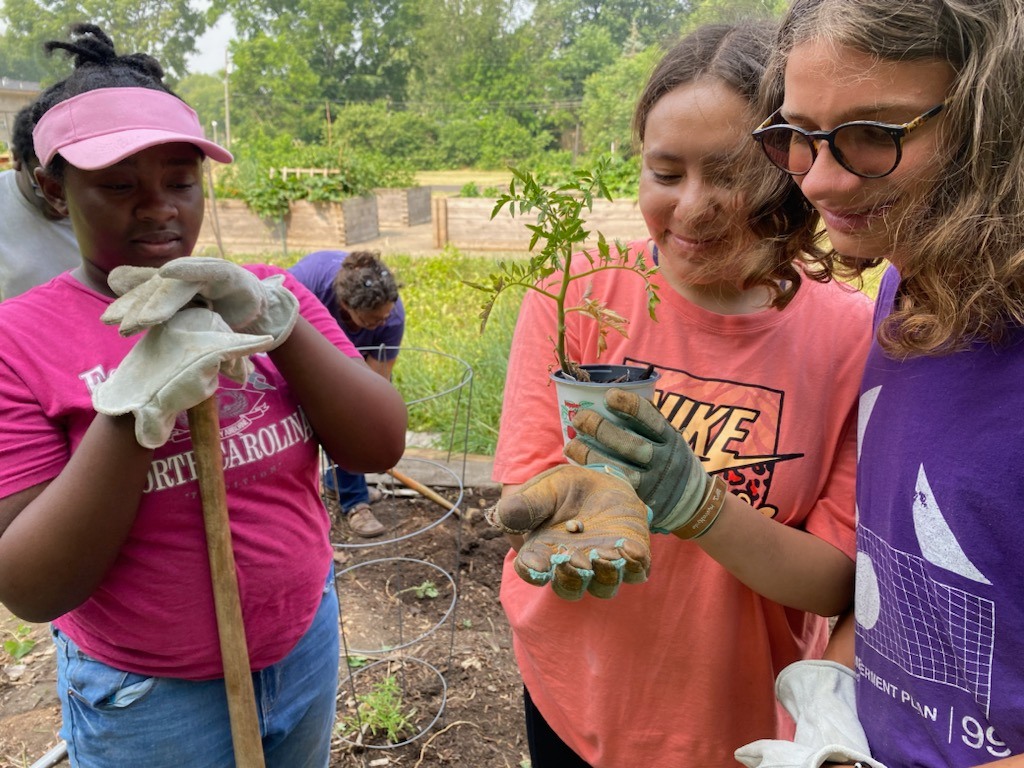
SP: Can you tell me about Solidarity Gardens?
Munro: Solidarity Gardens is a collaborative that aims to address food insecurity in our community by promoting gardening. We say we are “#NeighborsFeedingNeighbors #CultivatingCommunity,” and both parts of that — the feeding and the community — have been really important since its inception. Solidarity Gardens was initially conceived as a way to respond to a very urgent need for food during the COVID-19 pandemic. Danielle Chynoweth, the Cunningham Township Supervisor, convened a big group of local organizations to discuss the fact that their low-income participants — many of whom were already living off less than $6.40 in food subsidies per day — were suddenly being faced with many new barriers to accessing food. At the same time, lots of members of our community were stuck at home, feeling isolated, and looking for ways to connect. She proposed Solidarity Gardens to tackle both problems at once, by getting people outside and gardening, we could bring folks together and create a sense of purpose while also producing more good, healthy food for our neighbors in need.
Bacon: One of the most important ways we live out our mission is supporting a 15-garden network with funding, materials, and volunteers as needed. In return, these gardens help community members connect with each other, teach essential gardening skills, and donate food to those who need it. If you want a good picture of what that looks like, I suggest heading down to the Urbana Park District’s Organic Gardening Program plots at Meadowbrook Park. As a founding member of our Steering Group, the [Urbana] Park District provided a series of connected plots on the south end for community gardeners to work in together. The space is always so beautiful and lively.
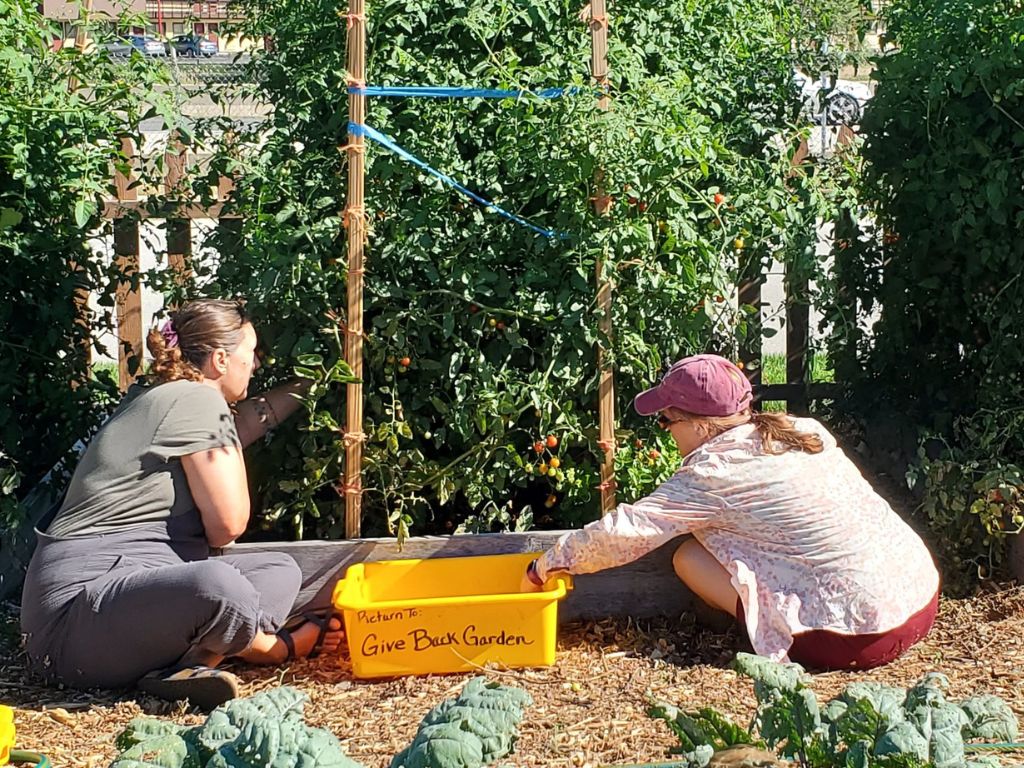
SP: You’ve used performance as one way to tell the stories of people who use these gardens, can you talk a little bit about that?
Smith: Like the gardens themselves, Solidarity Garden Voices started (and continues!) as a collaboration between lots of people. For the last decade or so I’ve been doing Voices projects in collaboration with different communities. Each project is a bit different, but each one seeks to build a stage so we can listen to the overlapping stories that people are living. Solidarity Garden Voices invited in collaborators from Garden administrators, organizers, gardeners, volunteers, neighbors, and people who eat some of the food growing here. The hope is to invite listeners to wander through some of the many ways that these community gardens root into people’s lives. And that hope became possible with support from Danielle Chynoweth and lots of other folks at the Cunningham Township, Anya Knecht and other folks at iRegen, and all the wonderful people who came together to share stories in this script. We first performed the script at Solidarity Garden’s Harvest Festival in 2023.
After the performance we passed the mic around to hear from audience members. Many of whom were also co-writers, having shared their stories for the script. One of my favorite moments, a moment where I feel this kind of performance alive and growing, was right afterward when someone took the mic to say, “So I’ve never done anything with the Gardens, but this kind of work, I’ve been wanting this. I feel like I’ve found my people.” And then that person got to talk with the Gardens’ volunteer coordinator. That’s a moment where storytelling and performance are literally bringing us together to collaborate.
Munro: I am really grateful for the opportunity to work with [Smith] and bring the story of Solidarity Gardens to life. Because Solidarity Gardens is a collaborative, and our efforts are distributed throughout our network, it can be hard to express what we do in a single, cohesive narrative. But really, this is a story about a community, a collective of people who care about each other and want to live well together. [Smith], the writers, and the actors have made that so beautifully clarion in Solidarity Gardens Voices. In fact, the performance was also featured at Healthy Champaign County’s second-annual Food Summit this April, because it speaks to the heart of what it means to share food in community.
SP: What does the process of getting food from the gardens look like and how can people find them?
Munro: Each of our Affiliate Gardens shares their produce with the community in a slightly different way. Some donate all their excess produce through the Solidarity Gardens network, others run community food distributions directly out of the garden, and still others partner with a specific food pantry or food delivery service. In general, you can find Solidarity Gardens produce during the season at Wesley Food Pantry, Sola Gratia Farm/CUPHD’s Free Friday Market and CUPHD Food Pantry, and it is also distributed through Sharing Table, a food delivery program managed by Cunningham Township Supervisor’s Office in collaboration with Channing Murray Foundation, HOPE and Wesley Food Pantries and Ride United. But for those that want to support their own food security by growing their own food, we administer a free plot program that provides growing space and support to low-income and immigrant learning gardeners. We try to be as flexible as possible to where the need is in our community. For immediate fresh food needs, I recommend getting in touch with the food assistance staff at Cunningham Township. They have the most up-to-date and responsive resources. Folks can call 217-384-4144 or email [email protected].
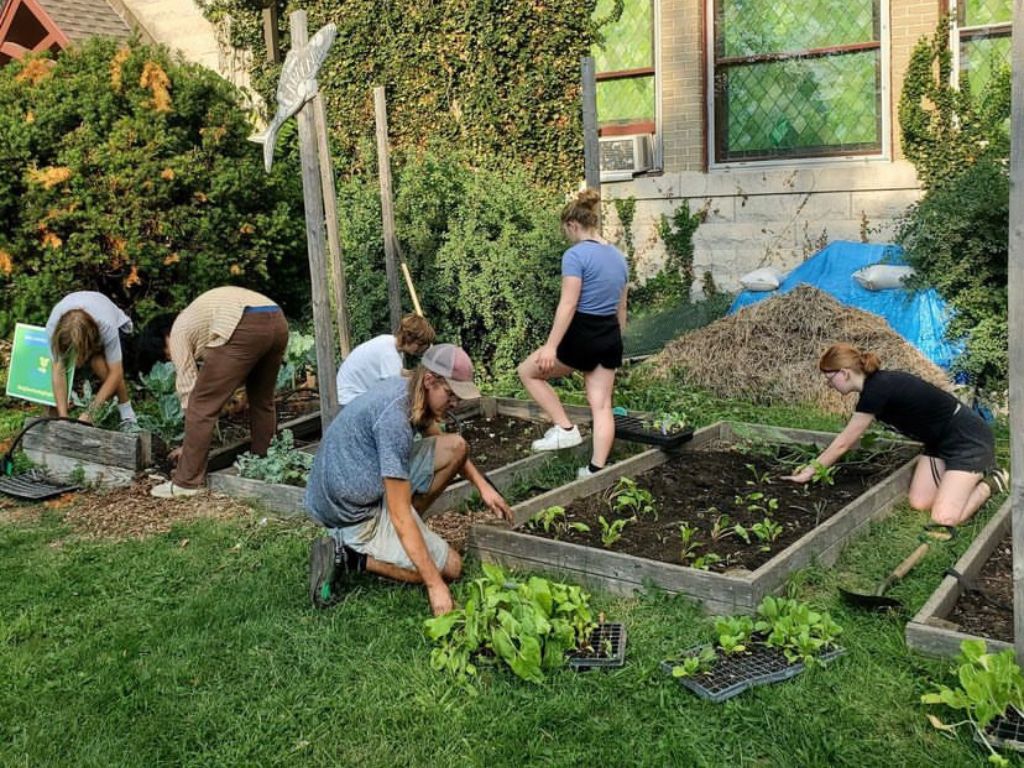
SP: Why are community gardens important?
Smith: You know, in scene four of the performance, one of the contributors talks about how afraid we can all be. Like as a community. With COVID, with so many of our news stories, with the economy what it is and climate change, it’s so easy to be so afraid. And then I live holding on tightly because everything feels scarce and I’m scared. The gardens are a place where we recognize and tend to the abundance of our communities. We can feed each other. That is literally true. And there are so many stories and systems telling us that life is always a competition, that I have to try and take more at the expense of making someone else have less, and that’s just not true. Or rather, it’s only one version of what society can look like — it’s true when we organize our community to make it true. And the community gardens are a practical way of planting collaboration, possibility, and support in our communities.
SP: What has been the best part of working with this organization?
Munro: We hold a monthly meeting for leaders of our Affiliate Gardens which rotates to a different garden each month. We start by working together in the garden for a little while, and then we all sit down to discuss what’s going on at each garden, what the roadblocks and needs are. Everyone helps each other brainstorm solutions to their problems and identify what tools and supplies they need. It’s a really sharing, collaborative, down-to-earth space. I really like that we’ve been able to create that and I love being a part of it.
Smith: You know I’m tempted to say my favorite part is that I’ve learned so much. I’d never dug up sweet potatoes until these gardens. But more than what I’m learning, I think my favorite part of working with Solidarity Gardens is becoming a community member with people. The way our economy works, I often feel pretty alone, sitting there on my couch, knowing there are people nearby, not knowing how to work with them toward something I believe in. And the Gardens means that someone texts me and says, hey, there are ripe sweet potatoes at a house not far away, and we need to harvest them before the frost tomorrow night. Can you come help?
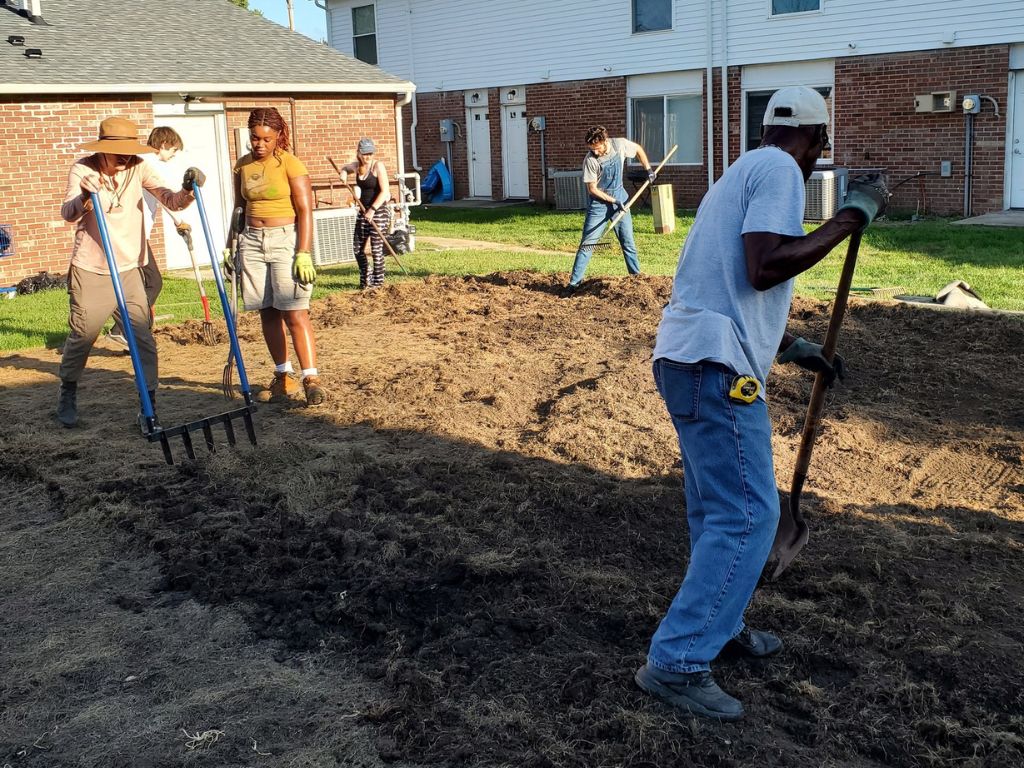
SP: What does success look like for this organization?
Bacon: The beautiful thing about working in such an open, collaborative structure is that success takes many different shapes. By the numbers alone, we had a lot of growth last year, with five more affiliate gardens joining and over 4,000 pounds of produce having been donated to those in need. But the mutual support and learning behind those numbers are successes in their own right. Late in the season last year, we had upwards of 20 people show up to help establish a brand new garden at the Aspen Court Apartment Complex. The energy in the air while these folks were getting to know each other, working together to turn grass into fertile soil for food, that was something special. Lastly, there’s something to be said for the way many of the gardens in our network become an important part of our community landscape. I think often about how many people must pass by the Cunningham Township garden — the one next to the mural at Race and Green — and enjoy the sunflowers growing there.
Munro: Yes, a vital part of the structure of Solidarity Gardens is that it’s not an organization, it’s a collaborative of multiple organizations working together within their areas of expertise to promote gardening in the community. It’s evolved since it was first conceived and it will continue to evolve in order to be as effective as possible at addressing food insecurity and building community.
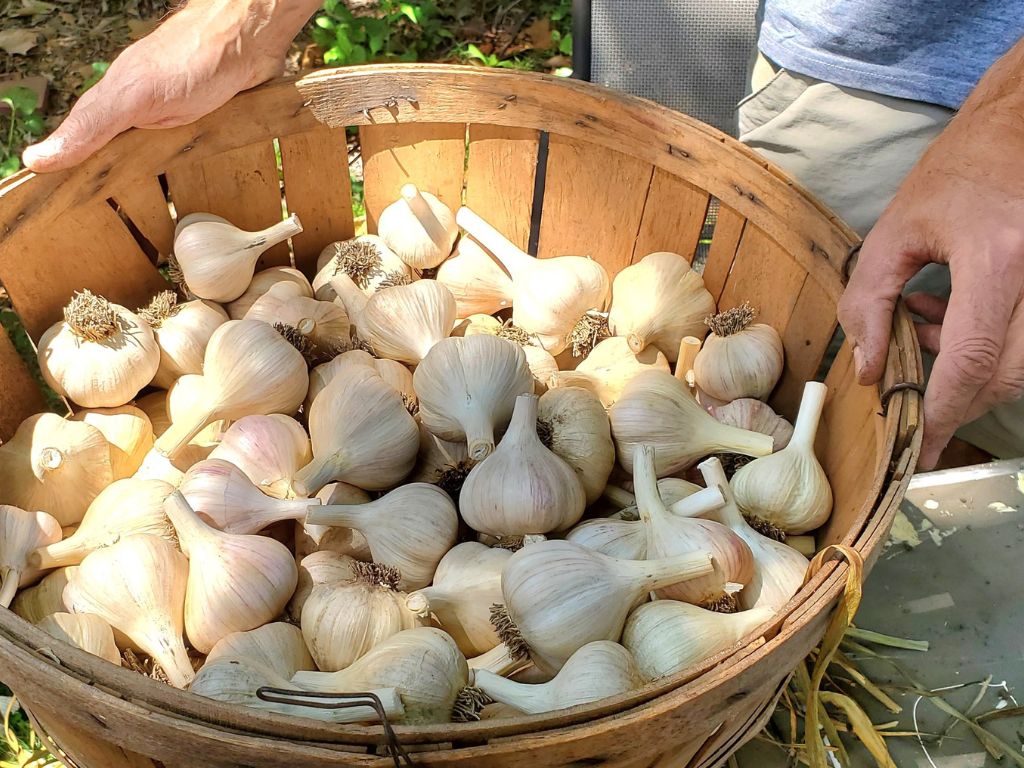
SP: What is your favorite food growing in the gardens?
Smith: Garlic. For sure. Everything needs a bit of chopped garlic.
Bacon: I’ve never been more proud than when we established blackcap raspberries up at our Wood Street Garden. It was such a deeply collaborative effort: A neighbor of mine had them growing in her backyard, and even though we hadn’t previously met, she was really excited when I knocked on her door and also gave me some great advice about how to propagate them. Those bushes will likely keep producing year after year in a place that was previously choked out with honeysuckle.
Munro: The ones that I don’t know, or don’t have a name for. A number of the gardeners we have placed with garden spaces through our free plot program are immigrants who plant foods from their home countries that I’m not familiar with. I love seeing these, because it means we are helping people access foods that they know, that they have memories of eating, that are culturally significant to them. It’s really a way of welcoming someone’s whole self into the community, and that gives me a lot of purpose.
SP: If someone wants to help this organization, how can they get involved?
Bacon: There are many ways to get involved, from volunteering in a garden (we love beginners and can connect you with great teachers!) to donating produce or funds. Our website is a great place to visit for all of these.
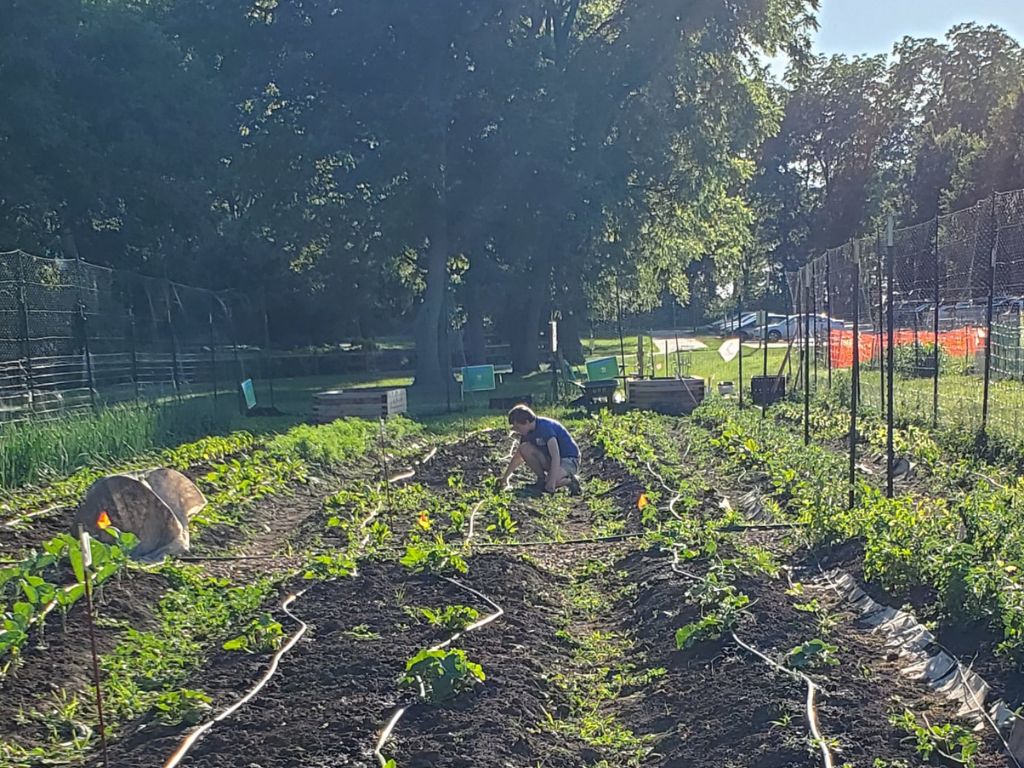
SP: Anything else you want to add?
Smith: When the cast and I were rehearsing to perform Solidarity Garden Voices at the Feeding Campaign County Food Summit, we rehearsed in that garden space that’s behind the apartments on Race Street, right near Lincoln Square Mall. The garden beds and the apple trees there are mentioned in the script. And while we were rehearsing, listening to the rustle of the apple blossoms, listening to the birds, feeling the earth “come alive with this abundance,” as one of the script’s authors says, [Bacon] came biking by. They were coming back from working at another garden, I think. And I was just thinking about how these gardens, and this performance, are rooted into our communities. How this is alive in the kind of mutual network that it also exists to support. And I just loved that. The flowers are beautiful this time of year, and they’re bringing fruit.








